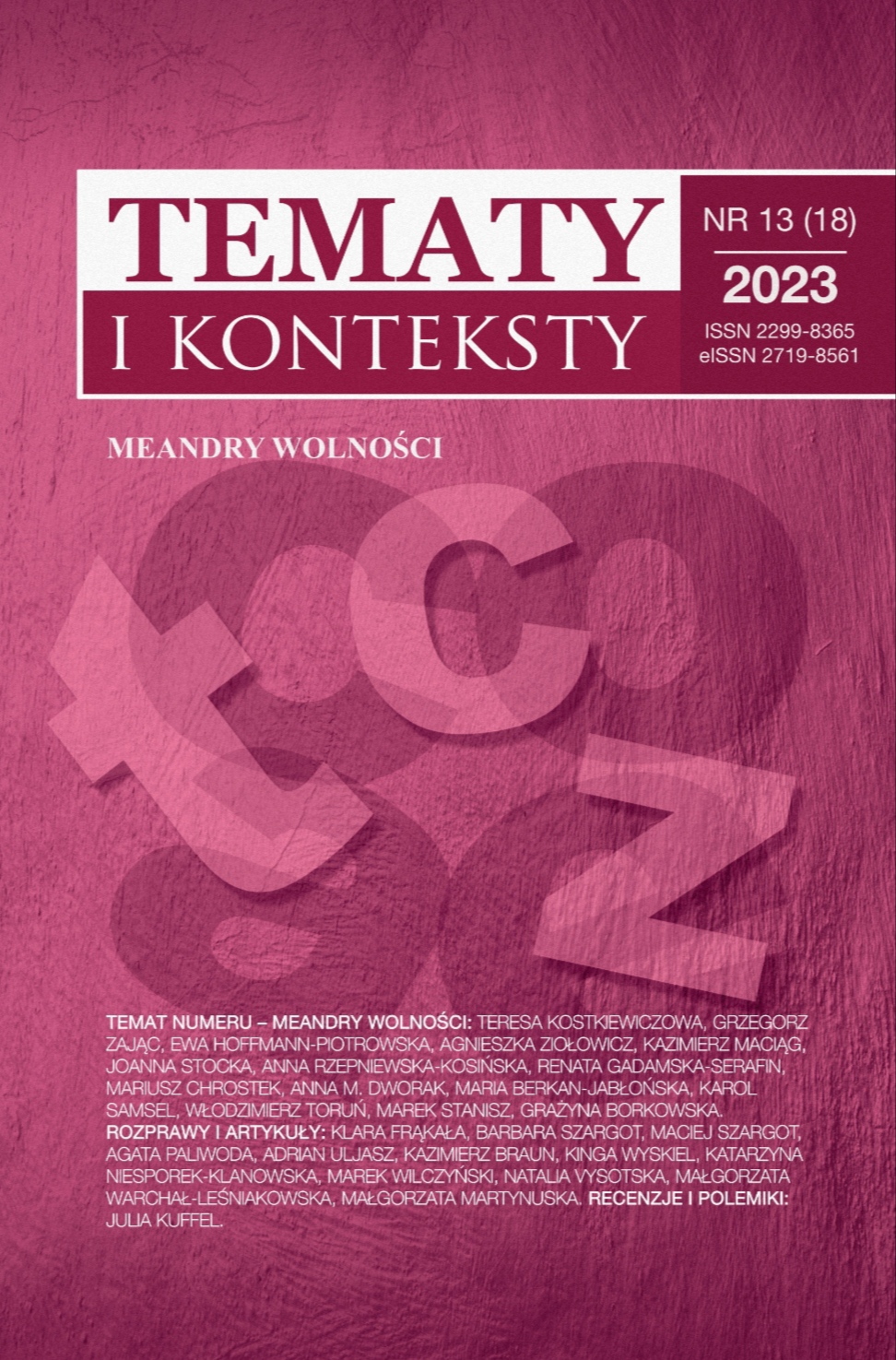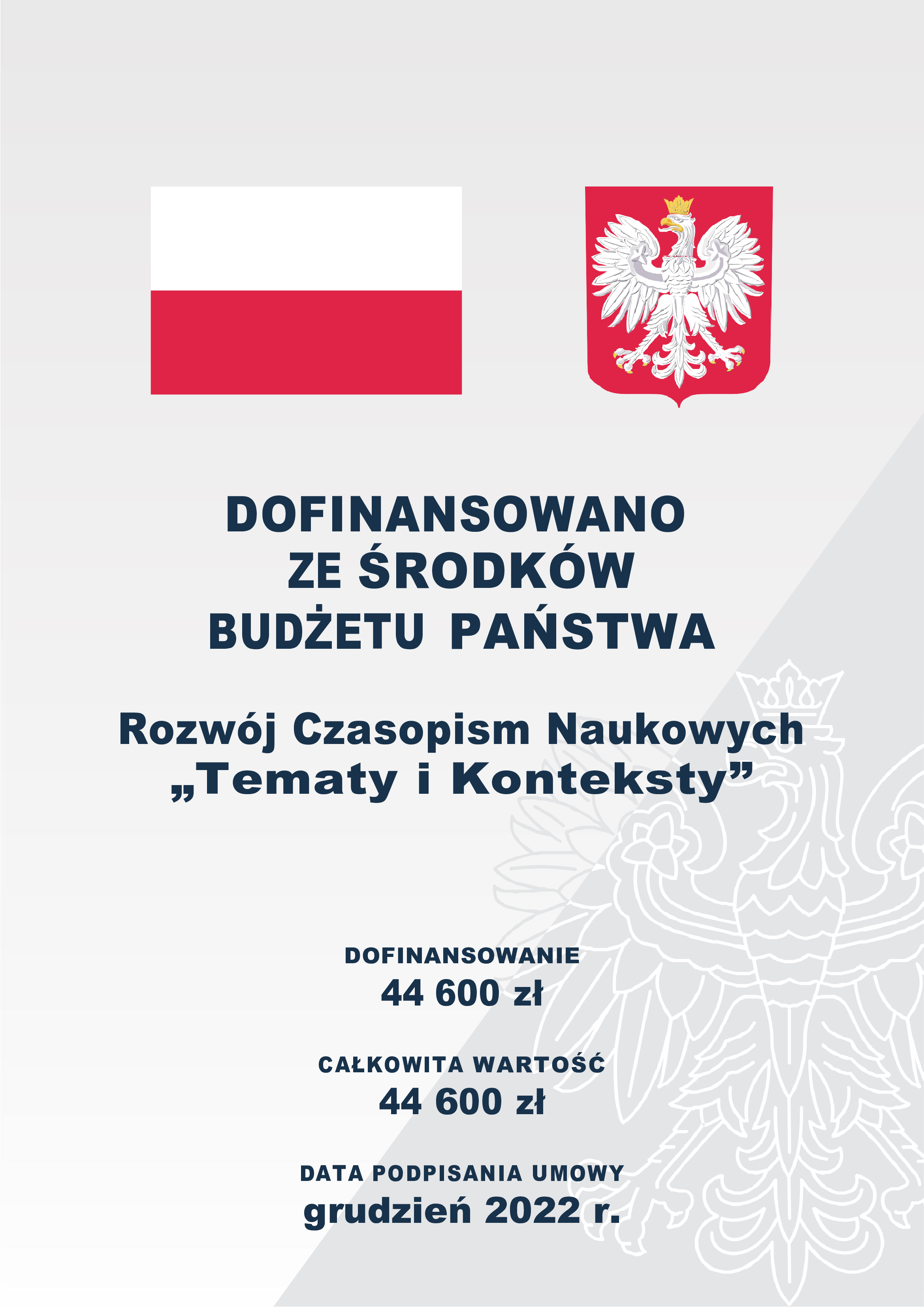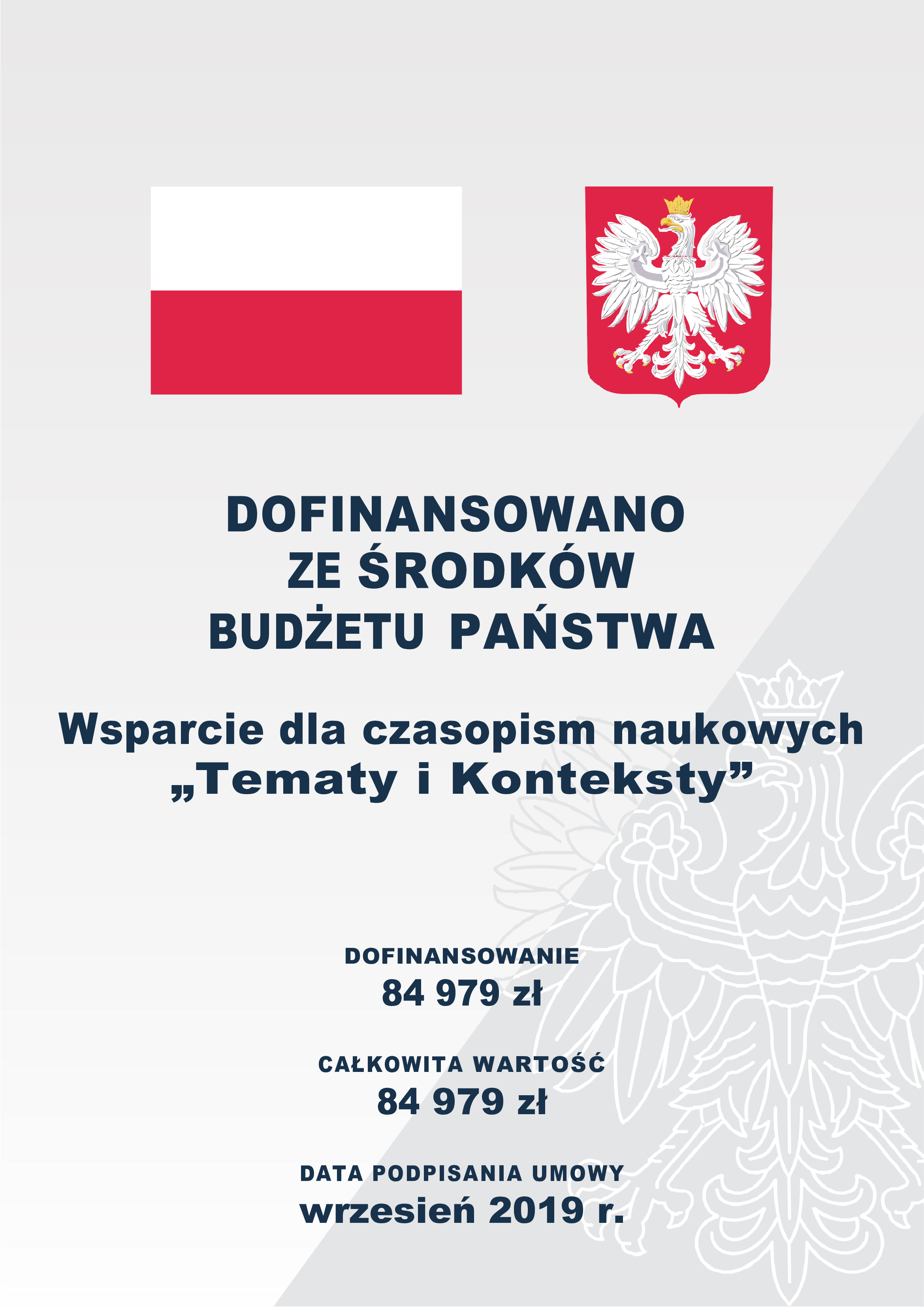O kilku sposobach uobecniania się motywu wolności lub jej braku w powieściach Pauliny Wilkońskiej
DOI:
https://doi.org/10.15584/tik.2023.11Słowa kluczowe:
Paulina Wilkońska, powieść popularna XIX wieku, niewola narodowa, relacje polsko-żydowskie w literaturze, motyw czytelnictwa w literaturze, autoterapeutyczna funkcja literaturyAbstrakt
W niniejszym artykule przedmiotem uwagi jest kilka sposobów uobecniania się motywu wolności lub jej braku w powieściach Pauliny Wilkońskiej, reprezentantki literatury popularnej XIX wieku. Zagadnienie to omówiono w odniesieniu do trzech sfer. Pierwsza z nich wiąże się z tematyzacją pragnienia wolności i doświadczania niewoli narodowej. Druga dotyczy ograniczeń swobody podmiotu w przestrzeni społeczno-obyczajowej, ze szczególnym uwzględnieniem sytuacji młodych ludzi poddanych przemocy przesądów i naciskom finansowym. Trzeci wymiar analizy obejmuje strategie wolności odautorskiej, wyrażające się w przyjemności pisania i jego autoterapeutycznej funkcji oraz wybranych zabiegach podtrzymujących więź z czytelnikiem. Bowiem to właśnie czytelnik jest tu traktowany jako niejawny, ale niezwykle ważny bohater prozy Wilkońskiej.
Downloads
Bibliografia
[***], Korespondencja z Gostyńskiego, „Dziennik Warszawski” 1855, nr 178, s. 4.
[a.a], Wspomnienie pośmiertne o Paulinie z Lauczów Wilkońskiej, „Dziennik Poznański” 1875, nr 134, s. 1–2.
Borkowska G., Phillips U., Czermińska M., Pisarki polskie. Od średniowiecza do współczesności, Gdańsk 2000.
Brownstein R. M., Becoming a Heroine: Reading About Women in Novels, Columbia University Press, New York 1994.
Deodat [Edmund Bogdanowicz?], Chmielowski o Wilkońskiej, „Kurier Warszawski” 1894, nr 90, s. 2–3; nr 91, s. 2–3.
Eco U., Sześć przechadzek po lesie fikcji, Kraków 1995.
Halec J. M., Koleje życia Augusta i Pauliny Wilkońskich, „Przyjaciel Ludu” 2013, nr 3, s. 8–16.
Hertz A., Żydzi w kulturze polskiej, Warszawa 1988.
Ilnicka M., Paulina Wilkońska, „Bluszcz” 1875, nr 28, s. 217–218.
Inglot M., Postać Żyda w literaturze polskiej lat 1822–1864, Wrocław 1999.
Jędraś S., Satyryk i humorysta, „Przyjaciel Ludu” 1995, nr 3–4, s. 42–44.
Koczkodaj I., Co czytają bohaterowie polskich powieści popularnych o tematyce współczesnej drugiej połowy XIX wieku?, w: Polska literatura wysoka i popularna 1864–1918.
Dialogi i inspiracje, red. I. Koczkodaj, K. Lesicz-Stanisławska, A. Wietecha, Warszawa 2011, s. 170–184.
Korespondencja Józefa Ignacego Kraszewskiego. Seria III: Listy z lat 1844–62, t. 22, Biblioteka Jagiellońska, Rkp. 6483 IV, k. 314 r. – 366 v.
Korespondencja Pauliny Wilkońskiej, Biblioteka Uniwersytecka w Poznaniu, Rkp. 1, k. 1–333 v.
Marzec L., Paulina Wilkońska, w: Wielkopolski alfabet pisarek, red. E. Kraskowska, L. Marzec, Poznań 2012, s. 343–353.
Matysek K., Paulina Wilkońska. Zapomniana powieściopisarka i pamiętnikarka, „Panorama Wielkopolskiej Kultury” 2005, nr 18/19, s. 16.
Nowaczyński A., Miejsca dla Pauliny Wilkońskiej!, „Tęcza” 1937, nr 12, s. 38–39.
Nowakowski J., W kręgu obiegowych ideałów estetycznych. Szkice o literaturze popularnej, Rzeszów 1980.
Przybyszewska A., „Służyć poczciwej sławie”. Twórczość literacka Pauliny Wilkońskiej, „Studia z Kultury Popularnej: prolegomena do dziejów kultury popularnej w Poznaniu” 2017, nr 1, s. 28–40.
Radońska T., August i Paulina Wilkońscy, „Warta” 1875, nr 53, s. 466–468; nr 55, s. 488–490; nr 56, s. 501–503; nr 59, s. 541–542; nr 61, s. 561–563; nr 63, s. 588–590; nr 64, s. 599–601; nr 68, s. 649–652.
Szpunar J., Gucio z Kąkolewa i jego Puchna, „Ziemia Leszczyńska” 1933, nr 3, s. 54–63.
Uriela [Gabriela Puffke], Cieniom śp. Pauliny z Lauczów Wilkońskiej, „Dziennik Poznański” 1875, nr 14, s. 2.
Wilkońska P., Fatamorgana. Powieść, cz. 1–2, Poznań 1859.
Wilkońska P., Gałązka cierniowa. Powieść, Poznań 1866.
Wilkońska P., Kazimira. Powieść, t. 1–2, Poznań 1869.
Wilkońska P., List do Stanisława Przyłęckiego, [b.d. i m.], Rkp. AGAD, sygn. 1/350/0/–/4181, k. 1–2.
Wilkońska P., Moje wspomnienia o życiu towarzyskim na prowincji w Kongresówce, cz. 1–2, Poznań 1875.
Wilkońska P., Moje wspomnienia o życiu towarzyskim w Warszawie, Poznań 1871; nowe wyd. cz. 1–3, z przedmową Z. Dębickiego, Warszawa 1907; wyd. powojenne: oprac. Z. Lewinówna, red. J. W. Gomulicki, Warszawa 1959.
Wilkońska P., Mrowin i Trock. Powieść, „Tygodnik Mód i Nowości” 1863, nr 3–15; 17–27 (dodatek).
Wilkońska P., Na dwóch krańcach. Powieść, Lwów 1873.
Wilkońska P., Na pograniczu. Zarys piórem nakreślony. Opowiadanie z przeszłości, Poznań 1864.
Wilkońska P., Obrazek poznański, Lipsk 1857.
Wilkońska P., Powołanie. Powieść, t. 1–2, Lwów 1874.
Wilkońska P., Precz z przesądem. Powieść, „Gazeta Toruńska” 1868, nr 18–53 [z przerwami].
Wilkońska P., Różni ludzie, t. 1–2, Warszawa 1853.
Wilkońska P., Skalińce: opowiadanie z przeszłości, t. 1–3, Poznań 1864.
Wilkońska P., Stella, „Tygodnik Mód i Powieści” 1874, nr 23–26.
Wilkońska P., Sto lat dobiega. Obrazek, Lwów 1891 [wydanie wspólne z powiastką J. Zachariasiewicza, Poseł – męczennik. Obrazek].
Wilkońska P., Wieś i miasto. Obrazy i powieści, cz. 1–2, Warszawa 1841.
Wilkońska P., Za późno! i Jeszcze dość wcześnie. Dwie powieści, t. 1–3, Warszawa 1846.
Witkowska A., Paulina Wilkońska, w: Literatura krajowa w okresie romantyzmu 1831–1863, t. 2, red. M. Janion, M. Dernałowicz, M. Maciejewski, Kraków 1988, s. 499–515.
Wojtyczek A., Tradycja i religia Żydów w literaturze polskiej XIX wieku, Warszawa 2012.
Zmorski R., [rec.] Irena, Pani Podkomorzyna, Obrazek poznański. Powieści Pauliny z L. Wilkońskiej, „Dziennik Literacki” 1858, nr 24–28.
Pobrania
Opublikowane
Jak cytować
Licencja
Prawa autorskie (c) 2023 Tematy i Konteksty

Utwór dostępny jest na licencji Creative Commons Uznanie autorstwa – Użycie niekomercyjne – Bez utworów zależnych 4.0 Międzynarodowe.




